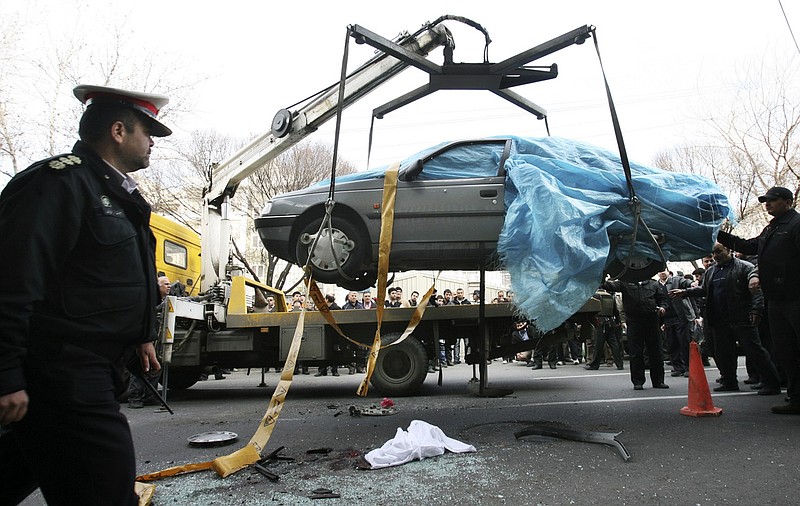TEHRAN, Iran (AP) - It seemed a clockwork killing: Motorcycle riders flashed by and attached a magnetic bomb onto a car carrying a nuclear scientist working at Iran's main uranium enrichment facility. By the time the blast tore apart the silver Peugeot, the bike was blocks away, weaving through Tehran traffic after what Iran calls the latest strike in an escalating covert war.
The attack - which instantly killed the scientist and fatally wounded his driver on Wednesday - was at least the fourth targeted hit against a member of Iran's nuclear brain trust in two years. Tehran quickly blamed Israeli-linked agents backed by the U.S. and Britain.
Secretary of State Hillary Rodham Clinton denied any U.S. role in the slaying, and the Obama administration condemned the attack. However, provocative hints from Jerusalem reinforced the perception of an organized and clandestine campaign to set back Iran's nuclear ambitions.
The day before the attack, Israeli military chief Lt. Gen. Benny Gantz was quoted as telling a parliamentary panel that 2012 would be a "critical year" for Iran - in part because of "things that happen to it unnaturally."
The blast killed Mostafa Ahmadi Roshan, a chemistry expert and a director of the Natanz uranium enrichment facility, the centerpiece of Iran's expanding program to make nuclear fuel. Roshan, 32, had planned to attend a memorial later Wednesday for another nuclear researcher who was killed in a similar pinpoint blast two years ago, Iranian media said.
"A heinous act," said Iran's Atomic Energy Organization of Wednesday's bombing.
It added a tone of defiance. "We will continue our (nuclear) path without any doubt ... Our path is irreversible," said the statement carried on state television.
The state news agency IRNA said Roshan had "organizational links" to Iran's nuclear agency, which suggests a direct role in key aspects of the program. Another news agency, the semiofficial Mehr, said Roshan had been interviewed by inspectors from the U.N. nuclear watchdog agency - which Iran has accused of placing its scientists in peril by including their names in public reports.
Natanz, in central Iran, is the country's main enrichment site. Officials said this week they were expanding some operations to an underground site south of Tehran with more advanced equipment.
The U.S. and its allies are pressuring Iran to halt uranium enrichment, a key element of the nuclear program the West suspects is aimed at producing atomic weapons. Uranium enriched to low levels can be used as nuclear fuel, but at higher levels it can be used as material for a nuclear warhead.
Iran denies it is trying to make nuclear weapons, saying its program is for peaceful purposes only and is geared toward generating electricity and producing medical radioisotopes to treat cancer patients.
The years of virtual stalemate between Iran and the West appear to be shifting into a new period of heightened pressures and tensions.
Russia strongly warned the West on Wednesday against any attack on Iran, saying it would upset global security.
Military action would be a "grave mistake, a flagrant error" with far-reaching consequences for regional and global stability, Deputy Foreign Minister Sergei Ryabkov told the ITAR-Tass news agency. "It could shake the foundations of the international system."
Tehran has accused Israel's Mossad, the CIA and Britain's spy agency of engaging in an underground "terrorism" campaign against nuclear-related targets, including at least three other slayings since early 2010 and the release of a malicious computer virus known at Stuxnet in 2010 that disrupted controls of some centrifuges - a component in nuclear fuel production. All three countries have denied the Iranian accusations.
Speaking in Washington, Clinton strongly denied any U.S. role in the latest attack.
"I want to categorically deny any United States involvement in any kind of act of violence inside Iran," she said. "We believe there has to be an understanding between Iran, its neighbors and the international community that finds a way forward for it to end its provocative behavior, end its search for nuclear weapons and rejoin the international community and be a productive member of it."
Israeli officials, however, hinted at covert campaigns against Iran without directly admitting involvement.
"Many bad things have been happening to Iran in the recent period," said Mickey Segal, a former director of the Israeli military's Iranian intelligence department. "Iran is in a situation where pressure on it is mounting, and the latest assassination joins the pressure that the Iranian regime is facing."
Iranian authorities pointed the finger at arch-foe Israel.
First Vice President Mohammad Reza Rahimi said Israeli agents were behind the assassination, but cannot "prevent progress" in what Iran claims are peaceful nuclear efforts.

